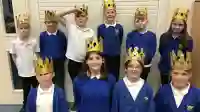"I don't see you as being disabled", said my friend at dinner the other night. The reactions of my other friends at the table were a clue they had said something inappropriate, but they weren't sure what. When we got home that night, they messaged me with a puzzled apology. I'd like to share with you my response.
I'm Proud to be Disabled
I'd like to explain how that kind of comment can feel from the inside.
I AM a disabled woman.
I'm proud of who I've become, both because of and in spite of my disability. I am really, really proud of my career, as well as the fun, independent life I lead.

I know I probably talk too much about my experiences and how I am feeling when I'm with friends who I know will be proud of me too. And that's who you are. I love that you're proud of me and am happy you try to show it.
Saying you don't look disabled implies there's something wrong with being disabled.
I also talk about my experiences because I spent 10 years pretending I didn't have Fibromyalgia, Ehlers-Danlos Syndrome, Endometriosis, or Dyslexia. I made myself sicker by trying to appear 'normal'. But everyone else around me was presenting as not disabled and so I felt I couldn't be disabled and still fit in. I didn't have disabled role models and I was terrified of what it would mean for my life and my career.
"you're lying, attention seeking, a hypochondriac"
When someone says "you don't look disabled" it sounds like they're saying: "you're lying, attention seeking, a hypochondriac". The medical profession did that to me for 20 years before someone took me seriously. They treated individual symptoms, rather than looking at the patterns. They told me it was normal to pass out from the pain of my periods and that I was just clumsy every time I broke a bone or sprained an ankle.
"your pain isn't real, your difficulties at work aren't real, you should just fit in and stop moaning about it".
I have spent 20 years getting up the courage to say to my friends: "sorry I need to adapt our plans so I can do them without making myself sick" and I am still scared every time I say it that they will decide I'm not worth the hassle.

"I see you"
It's a common misconception that saying you don't see colour, or disability, or sexuality, is saying you see the person and don't care about the characteristic in question. But what that person hears is "I don't see you".
Whether it is race, sexuality, gender or anything else, you're not acknowledging something that made them the person you want to be friends with and you're not giving them permission to be themselves with you.
You're also ignoring the negative experiences that are NOT OK rather than actively standing with them and saying you recognise those experiences shouldn't happen and want to help make them stop.

My friends make me feel seen.
I still love my friend
Thank you for being my wonderful, brave friend who makes me feel loved and who is honest and sweet enough to apologise when you're wrong. I hope this message hasn't hurt your feelings and if you ever want to ask me questions about anything I will always be honest and open and willing to listen as well as explain.
I love you. Really looking forward to seeing you again soon. Xxx

It's not just me...
A 2022 survey by BUPA showed that 68% of people with less visible disabilities have been told "you don't look disabled".
British Paralympian Kadeena Cox, who sometimes uses a wheelchair, was recently interviewed by BBC news, explaining how people often question whether she is really disabled.
When my mum sent me the article, it really hit a chord. I could empathise with her about people's reluctance to give up a priority seat on a train and while we don't share the same condition, like Kadeena I live with pain, brain fog, sensory issues and the unthinking, kindly-meant insensitivity of the people around me.
For more lived experience from people with invisible disabilities, as well as those with other protected characteristics or some form of difference, please do check out NHS Digital's Uncomfortable Conversations videos!
This invisible disabilities week, please ask questions, have compassion and, most of all, see us.

#invisibledisabilitiesweek 16-22 October 2022. Check out www.invisibledisabilitiesweek.org #fibromyalgia #ehlersdanlossyndrome #endometriosis #dyslexia #neurodiversity #youdontlookdisabled

Aspirations and Future Planning / December 20th, 2022
Christmas Roundup 2022
What a year it has been for Building Self-Belief – it is such a relief that we are finally getting back to normal after the ongoing uncertainly linked to the Covid restrictions. Now we are back in full flow, we have exciting times ahead.

Consett Heritage Project / August 10th, 2023
Rob Moran - Consett Heritage Podcast
Rob is Consett born and bred and has been active in the community in many fields over the years, including volunteering with the Consett Green Spaces Campaign and with the local Labour Party. He is involved with the group History of Consett Steelworks where his particular interest is researching its history. He also helps out at our local schools by taking the children on history tours of the ex-steelworks site. He also shares his love of the wider history of the North East, on his own fabulous Facebook group called Alfred's Guide.

Wellbeing and the Arts / August 16th, 2023
The King's Coronation Celebration - Tow Law Millennium Primary School
Building Self-Belief CIO supported Tow Law Millennium Primary School, County Durham and the wider community in a range of creative activities to mark the King's Coronation in May 2023. The project was generously funded by The National Lottery Awards for All Community Fund.